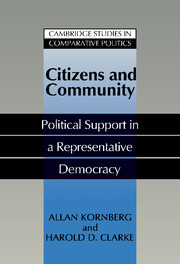6 - Elections and political support
Summary
Elections are basic means by which the people of a democracy bend government to their wishes. In both their symbolism and their reality free elections distinguish democratic regimes.
V. O. Key, Jr., Public Opinion and American Democracy, p. 458In a definition that has become famous, Joseph Schumpeter (1942:269) contended that elections are what democracy is all about. A democracy is an “institutionalized arrangement for arriving at political decisions in which individuals acquire the power to decide by means of a competitive struggle for the people's vote.” At their most fundamental level elections can be thought of as institutionalized alternatives to revolution. It is argued that when elections are genuinely free and competitive they help safeguard freedom; make possible peaceful transitions of political power; promote political stability by providing ordinary citizens with their principal vehicle of participation in political life; encourage them to engage in other forms of conventional political behavior; and provide them with a crash course on major problems confronting their country. In addition, elections are credited with helping democracies to achieve, or come close to achieving, formal political equality through the mechanism of one person, one vote. Perhaps most important from the perspective of democratic theory, elections are designated as the principal institutional mechanisms for providing ordinary citizens with regular opportunities to influence the policies of persons whom they select to lead them, and some scholars have contended that in periodic “critical elections” changes in the content and direction of those policies can be profound indeed (e.g., Key, 1955:3-18; Campbell, et al., 1960:531-8; Burnham, 1970).
Even those who contend that for a variety of reasons elections really do not give people either genuine choices among alternative policy options, or the ability to influence what those options are, acknowledge that elections provide opportunities to choose between competing candidates and, relatedly, to reward or punish incumbent elected officials for their behavior in office. They thereby enhance the accountability of political authorities to constituents they represent. At a minimum, even when elections do not adequately fulfill conditions set forth by democratic theorists (e.g., Dahl, 1971), they help legitimate the actions of political leaders and provide a measure of symbolic reassurance to the general public.
- Type
- Chapter
- Information
- Citizens and Community , pp. 176 - 213Publisher: Cambridge University PressPrint publication year: 1992



